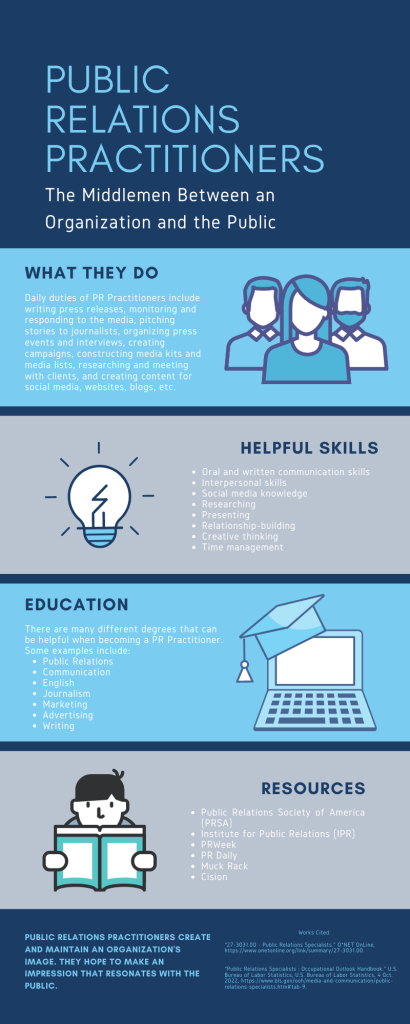Appendix — Writing at Work: Introduction to Professional Writing
Appendix
Careers in Professional Writing
The skills professional writers have—research, critical thinking, design, editing, and yes, writing—are skills that are useful in any industry. This means that professional writers are in demand in many different fields and use many different skills. As you will learn throughout this appendix, professional writing can take many forms and apply to many different industries. In this chapter, several different careers a person interested in professional writing could go into are outlined. These profiles include the important skills, preparation, and day-to-day tasks that are part of those careers.
Attorney
Web Designer
Graphic Designer
Editor (general)
Book Editor
Journalist
Sports Journalist
Grant Writer
PR Practitioner
Attorney
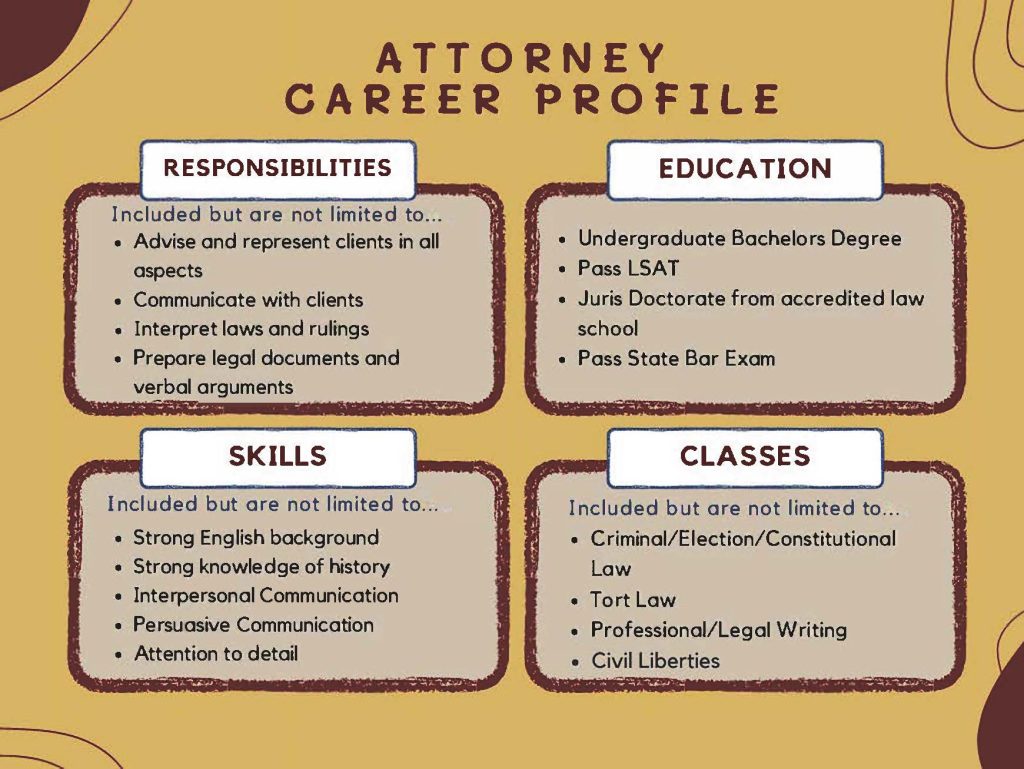
Web Designer
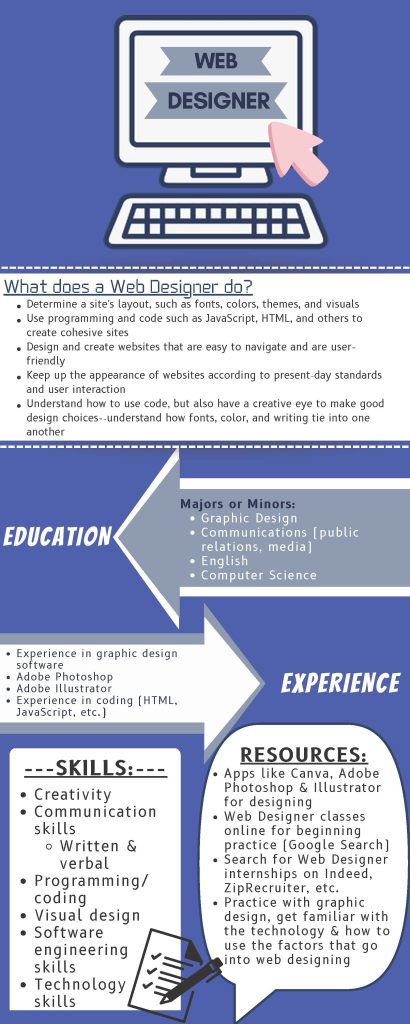
Graphic Designer
A graphic designer’s main job is to communicate through visual representation. Through the use of different elements they help convey ideas to an audience. As a graphic designer, you will be creating visual communications for websites, magazines, social media posts, and more. . .
Education:
Major Requirement – Graphic Design
Minor Recommendations – Web Design, Marketing
There are many classes you can take when studying to be a Graphic Designer: Graphic Arts and Printing, Web Page Design, 2D and 3D design, Digital Prepress, Color and Design, Multimedia & Animation, Desktop Publishing, and Digital Photography are just a few options. It is important to take a basic web design course in one of your first semesters.
Skills:
To succeed as a graphic designer, you will need proficiency in creativity, communication, understanding of interactive media, and typography.
Resources:
There are many free resources online for those striving to be a graphic designer. Pexels, Nappy, and StockSnap are just a few of the resources you can use. These are good programs to begin testing out your design skills. YouTube can also be helpful to look up tutorials on these programs.
For More Information:
Creative Boom: creativeboom.com
Monster: monster.com
New School of Architecture & Design: newschoolarch.edu
U.S. Bureau of Labor Statistics: bls.gov
BrainStation: brainstation.io
indeed: indeed.com
Workable: resources.workable.com
Editor (general)
Editing is a career essential to all forms of writing. Whether it be a favorite novel, a local newspaper, or even a favorite blog, all of the work one reads requires an editor.
The job title “editor” does not mean just one thing. There are numerous different types of editor positions and each one comes with a number of different responsibilities. Generally, editors read over content written by another person in order to correct spelling and grammar mistakes, assure comprehensible content, confirm information, and further develop ideas to understand the writer’s intentions.
The difference in job titles often indicates exactly what an editor is editing. For example, a copy editor looks at grammar and spelling specifically. They may make suggestions on word choice, diction, and organization, but do not look at aspects such as purpose or content.
Publication assistants do a similar job, but in a different environment. They work for a publishing company and read over and proofread manuscripts, both revising and editing the content.
Assistant and executive editors often work together, the assistant editor being under the executive editor. An assistant editor typically works on one specific subject. They may work for companies or firms, or may edit feature stories in local newspapers or magazines. The executive editor at that same company or firm typically oversees their work. They have the final call on whether a piece should be published. Editors who are even higher up, a managing editor for example, are responsible for an entire department.
The main goal of any editor is to enhance the readability of a writer’s work. Each of these positions enhance readability and determine how well a reader can understand a particular work.
To obtain a job as an editor, a Bachelor’s degree is required. More likely than not, editors receive a BA in English, but other similar degrees such as Writing or Communications are common, as well. These individuals must have strong grammar, spelling, and punctuation skills, while also being proficient writers.
It is common for companies to provide a test to job candidates to prove their editing skills before being hired, but grammatical competence is not the only thing it takes to be an editor. Additional qualities that may boost chances of success include creativity, accurate judgment, and attention to detail. Although small errors are important to catch, editors also must understand style, tone, and format. It is their job to identify possible misconceptions in a piece of writing and make sure the correct audience is reached.
If someone wishes to work in a specific field of publishing, they may need further education and training. For example, editors of medical writing may need additional education in medicine. In addition, many editors often receive their master’s degree in a specialized subject in order to obtain a certain position. This is not always necessary, but can be quite helpful.
Some schools may also offer helpful minors. Minors such as writing or literature may help one to further their English skills. Helpful classes may include editing, professional or technical writing, and any class whose intention is to build writing and reading skills.
Prior to beginning a career in editing, experience is important. Throughout one’s schooling, different opportunities may be presented that help them to gain this necessary experience. Many schools offer a school newspaper or even smaller magazines and blogs specific to certain clubs and organizations. Simply working for a school newspaper can build confidence and expertise.
Furthermore, many students acquire internships, allowing them to work in an actual work environment.
Overall, the work that goes into being an editor is very tedious and typically requires a good deal of patience. These positions are extremely important and make reading experiences much more effortless.
Resources
https://www.bls.gov/ooh/media-and-communication/editors.htm?utm_source=pocket_mylist#tab-4
https://www.pce.uw.edu/news-features/articles/how-to-become-an-editor
https://learn.org/articles/How_Can_I_Become_an_Editor_for_a_Publishing_Company.html
Book Editor
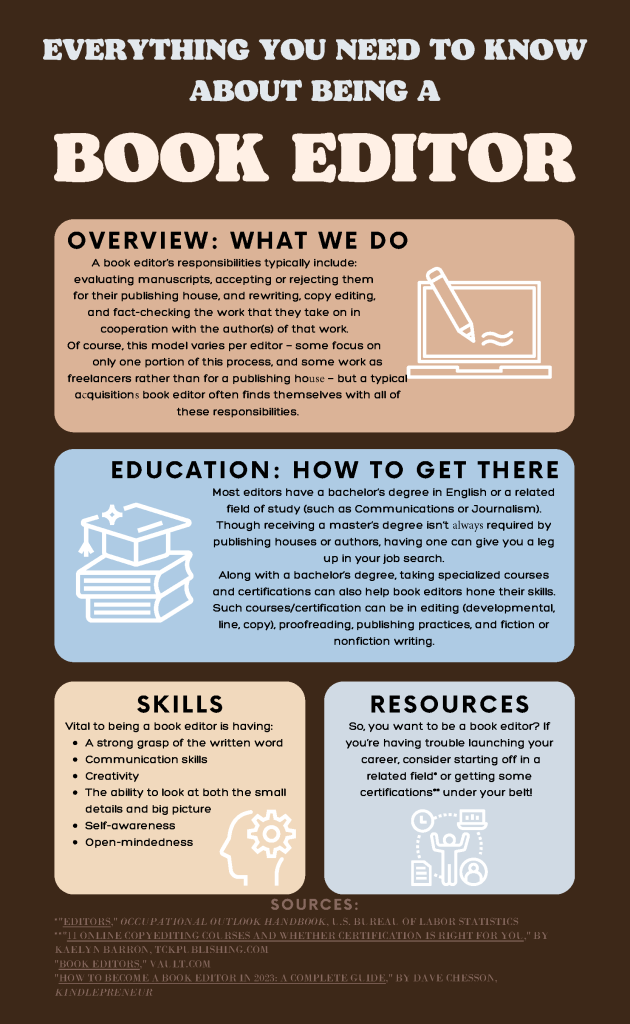
Journalist
WHAT DO JOURNALISTS DO?
Journalists research and write about information and events for the public to understand, telling the stories of every topic. Some journalists report on breaking news, and others spend years investigating a single topic to write one long-form feature.
Dry research, interviewing sources, fact-checking, and, of course, a lot of writing and revising are common pieces of the job.
Many sub-specialties within journalism each entail their own skill sets; video and photojournalists, for example, create records and portraits of events. Foreign correspondents live abroad and report back. War journalists physically travel to witness and investigate wartime events. Some journalists even take on social media communications to better inform the public.
WHAT SKILLS DO JOURNALISTS USE?
It goes without saying that journalists must produce polished writing, but beyond neat grammar, journalists must research, fact-check, and pay attention to every detail of their piece. (And of course, the job requires doing all of this quickly and under pressure!) The more hats one reporter can wear, the better—video, photo, and audio editing abilities are greatly useful and at times expected on top of writing skills.
While ethically objective writing is key, critical and analytical thinking is necessary to put a story together for the reader. Patience, people skills, and courage are often required to build relationships with sources, get interviews, and publish the truest story.
WHAT EDUCATION DOES A JOURNALIST NEED?
Most papers are looking for writers with degrees in journalism, communications, or English. But these are pretty common degrees— political journalist Kent Klein says, “There’s nothing wrong with a journalism degree, but I would prefer a content-based discipline— economics, politics or foreign relations, for example.”
The best path forward, then, may be a double major in a writing-based discipline and a content discipline (ex. English + Global Studies, Communications + Political Science).
Of course, nothing replaces experience, especially in such a unique industry. Students should be looking to gain hands-on experience out of the classroom to really jump-start their careers.
HOW COULD A STUDENT GET STARTED IN THE FIELD?
1. Local and Campus Papers
Experience is king in this competitive industry, so starting sooner rather than later is key.
2. Networking
Journalism is a small industry, so creating professional connections— shadowing people, attending conferences, snagging informational interviews— is important.
3. Internships
Continuing to build experience by stepping into the professional world is good.
RESOURCES
“8 Great Online Resources for Journalists and Journalism Educators,” Damien Radcliffe.
“Sites for Journalists,” Eastern Washington University Libraries Research Guide.
“SPJ Toolbox,” Society of Professional Journalists
Sports Journalist
What is Sports Journalism?
Sports journalism is a lively profession largely based in the interviewing, writing, and reporting of amateur, collegiate, and professional sports. Sports journalists leverage media to bring real-time game statistics, coach and player interviews, post-game analytics, and constant threads of news to fans around the world.
Key Skills
As a sports journalist it is important to have a general knowledge of how the sports industry operates both on and off the fields. Additionally, strong verbal and written communication skills, as well as the ability to use critical and analytical skills are highly valued. Sports journalists also need to be adept at content creation and social media experience across platforms.
Responsibilities and Expectations
Because of the unpredictable nature of journalism, job descriptions in sports journalism vary. Generally, consistent responsibilities include conducting research and interviews, producing and editing content for different social media platforms, and preparing for play-by-play broadcasting and or post-game analysis. Because of the fast-changing pace of the sports industry, journalists should be flexible and adaptable to developments in the market. In addition to this, individuals can be expected to work on multiple projects simultaneously, following different teams, players, and or sports. In this field, deadlines are specifically important in order to keep pace with day-to-day changes and feed information to fans and readers.
Salary
Salaries can range from $29,000/year to $120,000/year.
The Road to Becoming a Sports Journalist
According to the U.S. Bureau of Labor Statistics, sports journalists are responsible for attaining a bachelor’s degree, the most common degrees including Journalism, English, or Communications. During undergraduate education, prospective journalists are expected to acquire strong foundational skills in writing, editing, and content creation, in addition to interpersonal skills such as strong communication and ethics. While graduate master’s programs are not usually required, they are encouraged to better enforce fundamental practices taught at the undergraduate level. There is also increased flexibility in specializations at the graduate level, allowing students to pursue specific sports-related programs. Additionally, there may be salary implications based on education. The long-term goals of sports journalists often point toward jobs with large broadcasting organizations such as ESPN and CBS Sports, but can also include contributing to newspapers, magazines, and blogs.
Top Sports Journalism Programs
- Pennsylvania State University
- Indiana University – Purdue University Indianapolis
- University of Florida
The Different Types of Sports Journalism
Under the umbrella term of Sports journalism, there are 3 main groups of occupations: photography, digital writing, and broadcasting. Each of these categories share many of the same responsibilities, skills, and work life, however they do offer unique opportunities. Sports Photographers capture live game action to supplement writing and other content. Digital writers largely focus on research, writing, and editing responsibilities. Lastly, sports broadcasters contribute to the production of live sports commentary, in-game interviews and updates, and post-game analysis.
Conclusion
Sports Journalism is an exciting field that largely targets individuals who are passionate about sports, find joy in writing and reporting, and are comfortable with the daily chaotic changes experienced across all sports leagues.
Grant Writer
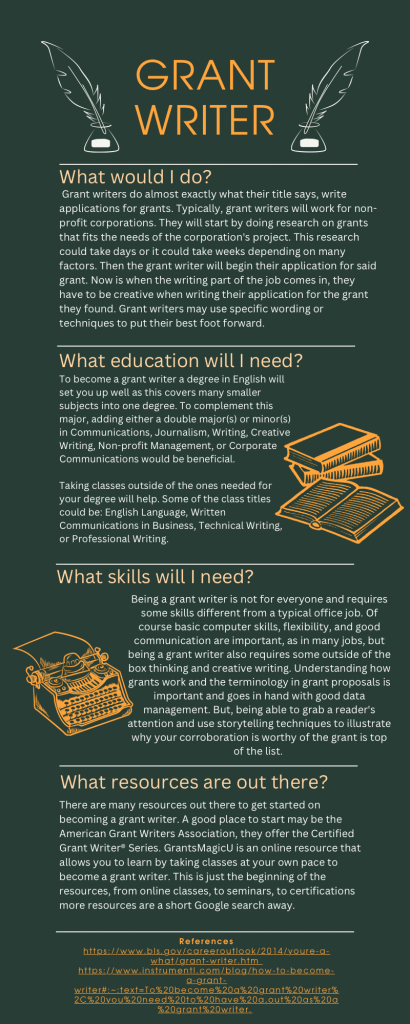
PR Practitioner
